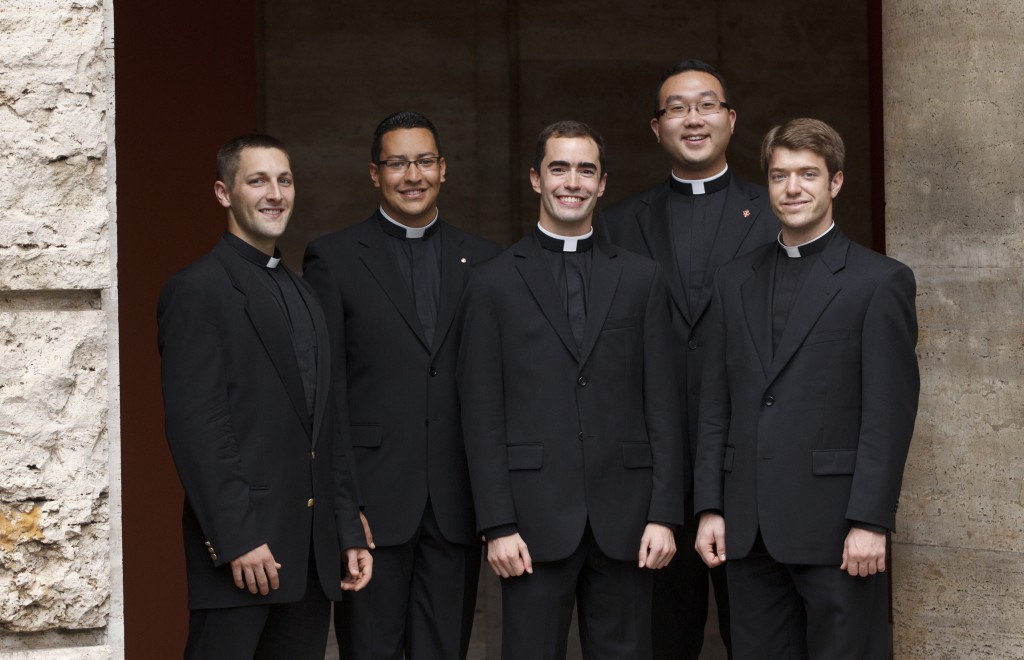
Pope Benedict XVI, in his eighth year as pontiff, is making his mark on a new generation of future priests, who have embraced many of his ideas and priorities.
For Danny Pabon, a seminarian from the Archdiocese of Newark, who just began studying at the Pontifical North American College in Rome, reading Pope Benedict’s account of the meaning of Jesus’ life and teachings was a turning point in the process of his discernment of a vocation, revealing for him “that this is the Jesus of Nazareth I want to follow.”
Even before he became a Catholic in 2009, Timothy Ahn said he already saw Pope Benedict “as a great theologian” who “diagnosed the problems of the world.” Ahn is now a seminarian at the NAC.
Nathan Ricci, who comes to the college from the Diocese of Providence, Rhode Island, said he especially admired Pope Benedict’s courage in promoting Catholic teaching in a world where many “want to ignore the faith.”
Such influence is not surprising, said the college’s rector, Mgr James Checchio, because Pope Benedict “is very rich in his writings about faith and the priesthood and speaks very endearingly to priests.” Men discerning a vocation “pick that up” right away, he said.
The college has been “at capacity” for the last two years with 232 seminarians, Mgr Checchio said, up from 150 men when he became rector in 2005.
That reflects a national trend in US Catholic seminary enrolment, which last year saw its highest numbers in almost a quarter century.
Mgr Checchio said the North American College’s current enrolment is marked by diversity and enthusiasm that reflect “the vitality of our Church and our country.”
Stephen Gadberry of the Diocese of Little Rock, Arkansas, said it wasn’t until he served in the Air Force that he felt called to the priesthood, and he credits the “great priests” whom he knew as military chaplains for crucial help with his discernment.
Like his military service, Gadberry’s work on his family’s farm in Arkansas taught him about discipline, setting goals, persevering and appreciating the fruits of labour, he said.
“I’m a simple guy,” he added. “I’m not scared to work so hopefully that’ll be a good service, going into the vineyard with hands ready to be put to work and feet ready to walk the journey.”
For evidence that simple and humble people can accomplish great things, Ahn said he looks to the example of St John Vianney.
The seminarian said he tries to model his life after the 19th-century parish priest, whom Pope Benedict put in the spotlight when he declared him patron of the world’s clergy during the 2009-2010 Year for Priests.
The pope called that jubilee year to help purify the priesthood after a decade when the sins of sex abusers had sullied the clergy’s public image and morale.
He also presented the French saint as a model of the fight against indifference and secularism, one soul at a time.
Mgr Checchio said that seminarians today are acutely aware of the challenges the Church faces, especially the problem of secularism.
“They really want to help with the work of the new evangelisation,” the rector said.
The young seminarians arrived in Rome just in time for October’s world Synod of Bishops on the new evangelisation, a project aimed particularly at revitalising the Church in an increasingly secular West.
Ricci said he believes the way to change hearts is to care for people “in a way that transforms.”
Because not everyone goes to Mass, he said, priests will need to “go door-to-door” and find new ways of re-proposing the Gospel.
For Pabon, the separation of Church and culture in the United States is not something he is used to from his native Colombia, where public policies and social mores are often inspired by Christian doctrine.
Because faith has become so divorced from much of US culture, he said, it will be important to promote the teachings of the Church, especially when they bear on the burning issues of the day.
Ahn, who studied to become a Presbyterian minister before becoming a Catholic, said the Church’s biggest challenge today is counteracting the despair toward life and hopelessness stemming from the belief that “we can’t know or attain anything higher than the mundane and the carnal.”
Michael Hendershott, a seminarian from the Diocese of Knoxville, Tennessee, said it was his exposure to the traditional Latin Mass, which his parish started to offer in 2005, “that really showed me, really clarified in my mind the idea of the priest as a man ordained to offer sacrifice for the glory of God and the salvation of souls.”
Though the seminarians at the NAC were born after the reform of the Roman liturgy, “quite a few” of them are familiar with the celebration of the 1962 Roman Missal, Mgr Checchio said.
Some want to study the Tridentine Mass “to be prepared if they are asked to celebrate it,” he said, but also because “they say it helps them understand the ordinary Roman rite.”
Mgr Checchio said it’s auspicious for his new group of seminarians that this academic year will coincide with the Year of Faith, which Pope Benedict has called to begin on October 11.
Pope Benedict is helping define what it means to be a priest, the rector said, by putting new emphasis on faith.
The pope is teaching them that “it’s not enough to just be a priest, you have to be first and foremost a believer.” – CNS